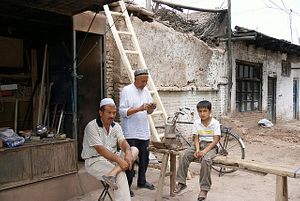Much has already been made of the recent news coming out of China’s westernmost province – that parents have been prohibited from choosing names like “Muhammad,” “Medina” and “Jihad” for their children. Despite widespread and public dismay over the reports, the rules represent not merely a singular, one-off development, but can be neatly traced to even more insidious legislation recently passed in China’s Xinjiang Uyghur Autonomous Region (XUAR) this month.
It was recently reported that parents living in the XUAR have been forbidden from selecting baby names from a list of 29 provided by the regional government there in an effort to “curb religious fervor.” The new measures come following a more limited ban that was rolled out in September 2016 in at least one county in Hotan prefecture in the region’s south.
Although not mentioned directly, it is no secret who the proscriptions target – the Uyghur community which makes up nearly half the region’s population practice Islam and have been a target of assimilationist policies for years.
The story was quickly picked up by the New York Times and the Guardian, ostensibly signalling its import, but neither unfortunately acknowledged the source of the rules, which also include a ban on beards that was announced earlier this month and landed on the pages of the BBC and CNN to a similarly heated reaction.
Speaking to Uyghurs in and outside of China, surprise is not a word that comes to mind. To the contrary, China’s recent step is plainly linked with government efforts going back decades to the present.
It is no secret that Uyghurs have found themselves under the heel of the Communist Party. Uyghurs have been subjected to increasingly strict controls ranging from a significant narrowing of religious freedom to curbs on cultural expression to significant restrictions on freedom of movement.
Crucial to understanding China’s move here, however, is a piece of legislation that quietly took effect on April 1 in the region. The XUAR Regulation on De-extremification, adopted at the 28th meeting of the Standing Committee of the 12th People’s Congress for the XUAR on March 29, sets out much broader proscriptions that will have lasting effects on the Uyghur community.
As with recent legislation targeting Uyghurs, like the Counter-Terrorism Law of the PRC passed at the end of 2015, the new law sets out broad and often vague definitions for key concepts like “extremism.” According to Article 3 of the Regulation, extremism is defined as “propositions and conduct using distortion of religious teachings or other means to incite hatred or discrimination and advocate violence.”
Following from this, Article 9 specifies a long list of “words and actions” that may be considered extremism including possessing, accessing or distributing materials with extremist content, bearing symbols of extremification, interfering with weddings or funerals and “Other speech and acts of extremification” – the latter being a catch all term that will allow for limitless interpretation.
The same article also includes, “[S]preading religious fanaticism through irregular beards or name selection,” providing the regional government legal cover for their proposed new rules this week.
Specifics aside, the Regulations provide the basis for much more extensive control over the Uyghur community and the potential for the emergence of more than just a prohibition on beards or baby names. The Regulations do a masterful job drawing a straight line from Islam to extremism and violence and in doing so, set Uyghur Muslims within the sights of future derivative policies.
The problem then, is that while we discuss these seemingly detestable measures as they arise, too often we fail to understand the broader scope and purpose of policies themselves and in what context they appear in the first place. Much less is made of the substantive policy that has been couched in a wider campaign to assimilate the Uyghur community for years in the region.
It has not been the intention of the Chinese government, however, to pull off the band-aid too quickly, but to take small steps over time to wean a population from its cultural roots by slowly chipping away at its foundation until there isn’t much left.
That being said, before we are simply outraged at the prospect of mothers unable to name their children or men forced to shave down their beards, the goal first must be to ask, why now? Or what is China’s broader undertaking here?
To answer these questions takes more commitment and it must also be said that we cannot be too quick to criticize coverage given that column space and Twitter characters are indeed limited in 2017. The answer in this case will be to work to ensure that contextualization of any issue remains paramount, which is where we see the role of NGOs and other actors emerge in providing that context if the state in question is reluctant or merely intransigent.
Lack of context continues to plague the media and hinders our ability to see all relevant aspects of something as contentious as China’s long relationship with the Uyghur community there.
Without it, we fail to see its antecedents and what it means for the future of that relationship. Without it, we are denied the ability to work to solve these problems with full perspective. Without it, we miss the point.
Peter Irwin is an MSc Human Rights graduate from the London School of Economics and Political Science (LSE) and currently works in Munich, Germany as Project Manager at the World Uyghur Congress, an international human rights advocacy organization representing the collective interests of the Uyghur Muslim minority in China.

































